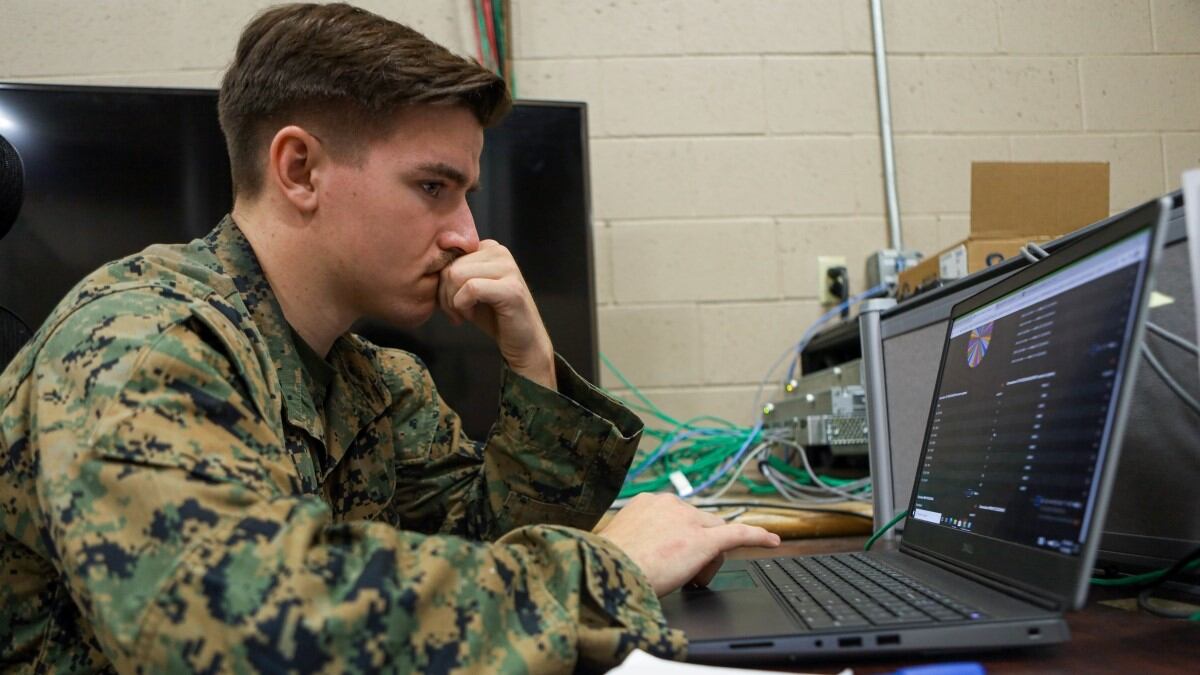The Marine Corps has launched a pilot program that will allow qualified recruits to enter the Corps with a rank as high as gunnery sergeant.
The two-year Marine Talent Acquisition Pilot Program, announced Friday in a Marine Corps administrative message, is targeting Marine veterans, qualified prior service members from other branches and civilians with specific qualifications.
The pilot program will focus on military occupational specialty shortfalls, specifically in cyber and signals intelligence, for this first effort, according to the message. Those jobs are 1721 cyberspace warfare operator and 2629 signals intelligence collection manager.
“The time and investment in identifying, acquiring, and developing talent is significant, especially in these fields,” Lt. Gen. James Glynn, deputy commandant of Manpower and Reserve Affairs, said in a statement. “This initiative enhances readiness and contributes to lethality by leveraging proven private sector talent to rapidly meet critical areas of capability.”
All military services have struggled to recruit and retain cyber specialists, who often can command significantly higher salaries in civilian jobs.
In July 2023, the Marine Corps tripled its signing bonus for new cyber enlistees to $15,000 up from the $5,000 bonus from the previous year. It was the highest signing bonus for any job in the Marine Corps at the time.
The Corps is considering Marine veterans, prior service military members and civilians.
RELATED

If accepted, the applicant would begin receiving pay up to the rank of gunnery sergeant, or the E-7 pay grade, once they begin recruit training.
Current pay for an E-7 with less than two years’ service is $3,625 a month or $43,500 annually.
Marines in this pilot program will be allowed to progress through standard promotions to the ranks of master sergeant, E-8, and master gunnery sergeant, E-9.
They will not be allowed to promote to first sergeant, E-8, or sergeant major, E-9.
Civilians and other prior services will be required to complete Marine Corps recruit training. Marine veterans are not required to repeat recruit training.
The candidates will then be allowed to wear their rank upon completing job training, according to the message.
The program is looking to find 10 qualified applicants across both specialties, Manpower and Reserve Affairs spokeswoman Maj. Danielle Phillips said. The command hasn’t yet decided if this recruitment effort may later include other high-demand job specialties.
Manpower and Reserve Affairs will oversee the pilot with members from Marine Corps Recruiting Command, Training and Education Command, and the two job fields serving on the acquisition panel, Phillips said.
“The pilot is currently focused on these two occupational specialties and serves as a proof of concept on where we may go next,” Phillips said. “While we are not currently considering additional MOSs, we will assess the feasibility of expanding over the course of this pilot.”
The message requires performance feedback on the Marines and the pilot program’s process at the six month and one year mark from when the applicants begin serving in their billet.
Civilians and other prior military service members must ship to recruit training prior to age 35. Marine veterans age requirements are assessed through calculations based on their age, years of active service and whether they could complete 20 years of active service before age 62.
The job qualification requirements are detailed. Marine veterans seeking to re-enter the Corps must have held certain jobs.
For the cyberspace warfare operator, a Marine previously must have held that specialty or one of the following specialties: 2611 cryptologic cyberspace analyst or 1711 offensive cyberspace operator. The minimum requirement includes having completed the Joint Cyberspace Analyst Course, but the preferred credentials include the U.S. Cyber Command/National Security Agency exploitation analyst work role certification.
For other military services, the applicants must have held either an Army 17 series, cyber operations specialist; Air Force 1B series, cyber operations; and for the Navy a cryptologic technician networks cyber warfare technician series specialty.
On the civilian side, those without military experience must have a degree in one of the following: computer science, information systems, engineering or related discipline and knowledge or experience with the National Security Agency’s post-apprentice cryptologic cyber network operator training standards.
For the signals intelligence collection manager, a Marine must have held one of the following job specialties: 2621 communications intelligence/electromagnetic warfare operator; 2631 electronic intelligence/electronic warfare analyst; 2641 cryptologic language analyst; 2651 intelligence surveillance reconnaissance systems engineer.
For other military services, signals intelligence applicants must have held either an Army 35 series military intelligence; Air Force 1N intelligence series or Navy cryptologic technician series.
Civilians seeking the signals intelligence job must have a degree in one of the following: computer science, information systems, engineering or related discipline and experience with signals intelligence, electromagnetic warfare, cyberspace operations collection and ground processing architecture and associated systems.
Todd South has written about crime, courts, government and the military for multiple publications since 2004 and was named a 2014 Pulitzer finalist for a co-written project on witness intimidation. Todd is a Marine veteran of the Iraq War.




